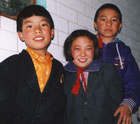
Children of Tibet 2003
Distributed by Filmakers Library, 124 East 40th Street, New York, NY 10016; 202-808-4980
Produced by Hyperfilms and Australian Film Commission
Directed by Melinda Wearne
VHS, color, 53 min.
College
Asian Studies, Education
Date Entered: 02/28/2006
Reviewed by Jessica Schomberg, Minnesota State University, MankatoThrough interviews, location footage, and maps, this documentary portrays the struggles of Tibetans to retain their culture through education. Three young children and a 22-year-old man serve as the primary focus as they recount why they left Tibet and the rigors of their journey to India.
After leaving their families, they traveled to the border of Tibet and across the Himalayas on foot before reaching Kathmandu, Nepal, where they were transported to the Tibetan Refugee Center in Dharamsala, India. Along the way, they faced possible arrest, frostbite, and death. Finally arriving in Dharamsala, the group was granted an audience with His Holiness the Dalai Lama, during which they were promised a modern education grounded in Tibetan culture and Buddhism. After their audience, they were sent to one of several schools based on age. The 22-year-old had left a good paying job in Lhasa with the hope of attending university; instead, he was sent to a three-year school because of his age. The younger children have the possibility of attending university. The unifying goal for most of the refugees is to become well-educated, so that when they are eventually allowed to return to Tibet they can restore their culture in their homeland.
The dialog is in Tibetan and English with white English subtitles when necessary. The picture and sound quality is good and the maps are helpful additions.
This documentary provides insight into the minds of those who wish to achieve better things for their children through an education that respects their language and cultural identity. Highly recommended for academic libraries collecting in areas including Asian studies and refugee or minority education.
Awards